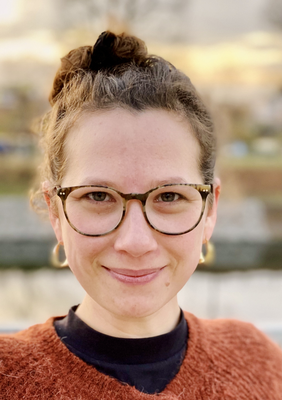Profile of Tabea Naujoks
It’s long been an aim of many working women to achieve a more equal distribution of household work, child care, and paid labor with their partners. What are the factors that play into whether this vision can become a reality? The genders of the people involved? Public policy? Whether the couple has children? Good intentions on the part of the couple?
These are the questions Tabea Naujoks is pursuing in her doctoral research. Naujoks is a PhD candidate in the RTG Dynamics research group at Humboldt-Universität zu Berlin and the Hertie School. Her work centers around the distribution of paid and unpaid work in couples with children in the household.
She was originally drawn to sociology for its balance between theory and reading on the one hand and empirical work and analytical thinking on the other. Being able to think about theory and society one day and work with data and graphs the next spoke to her various interest and talents. After finishing school in Mainz, she got her BA in the social sciences and philosophy at Universität Leipzig and her MA in sociology and European societies at Freie Universität Berlin.
Naujoks took to academic work quickly, realizing early on in her undergraduate studies that she enjoyed research and felt driven to find out new things. But, having come from a non-academic background, she wasn’t always so sure that the academic path was open to her. Encouragement from those around her helped to change that. “Throughout my bachelor’s and master’s, I always had people around me that supported me and told me ‘You could do this’,” she said.
Her dissertation centers around gender inequalities in the home and in the labor market with a focus on couples with children, specifically different-gender couples consisting of a man and a woman and same-gender couples consisting of two women. She takes as her starting point the fact that, in man-woman partnerships, women take on a disproportionate share of unpaid housework and of childcare especially. “I personally think that we can see a lot of improvements with regard to gender equality in the last few decades. Women are in the labor market. But things change when there is a child. With a lot of couples, if you ask them how they want to divide things before they have a child, they want to be very equal about it. But once the child comes everything is different,” Naujoks explains. “This is the puzzle I’m trying to solve.”
In three studies, Naujoks examines different factors that contribute to the division of paid and unpaid labor among couples. The first study turns to a corona-era phenomenon: When fathers in different-gender couples were put on short-time work (Kurzarbeit), they took on more childcare. While later studies show that things more or less went back to usual after the lockdowns, Naujoks’s findings point to the possibility that changing the amount of paid work men do might be one way to change their participation in unpaid care work. “That has policy implications. We could think about, as other countries do, increasing the share of parental leave that fathers have to take,” she suggests.
Her second study takes up what she terms the perception gap – the difference in how men and women report dividing up unpaid work in their partnership. The study documents this gap and shows that it increases in the year when a couple has their first child. The last study in her dissertation looks at differences between cohabiting different-gender couples consisting of a man and a woman and same-gender couples consisting of two women. What she found is that the same-gender couples divide paid work more equally. This points to a cultural or normative explanation for the inequalities we see in man-woman partnerships.
While her research contributes to the fight for more equality for women, Naujoks remains critical about her role as a sociologist. “In my bubble, a lot of people are for gender equality. But is this what my neighbor from my hometown really wants? Or is this something that I as a sociologist just put on to people?” she reflects. “Who is in a position to say which direction we go in?”
What she is sure about, though, is the importance of spreading awareness and educating people on all levels. That includes on the individual level so that people can make informed choices about their lives, on the academic level among other researchers, and on the policy level. Her hope is that her research work is relevant to our current situation and can inform policy considerations.
And she won’t be stopping anytime soon. Her mind is already buzzing with new ideas for new projects. She hopes to jump into the next one after her PhD, a project with Michaela Kreyenfeld and Heike Trappe on the intensification of parenthood and the transfer of social class. And then? The possibilities are open — working at a research institute, as a researcher in a ministry, focussing more on teaching, and communicating science to the public are all avenues of interest for her. “My engine is curiosity,” she says. “I ask myself a question, and I really want to know the answer to that question.”
written by Nad Porter-Kasbati

